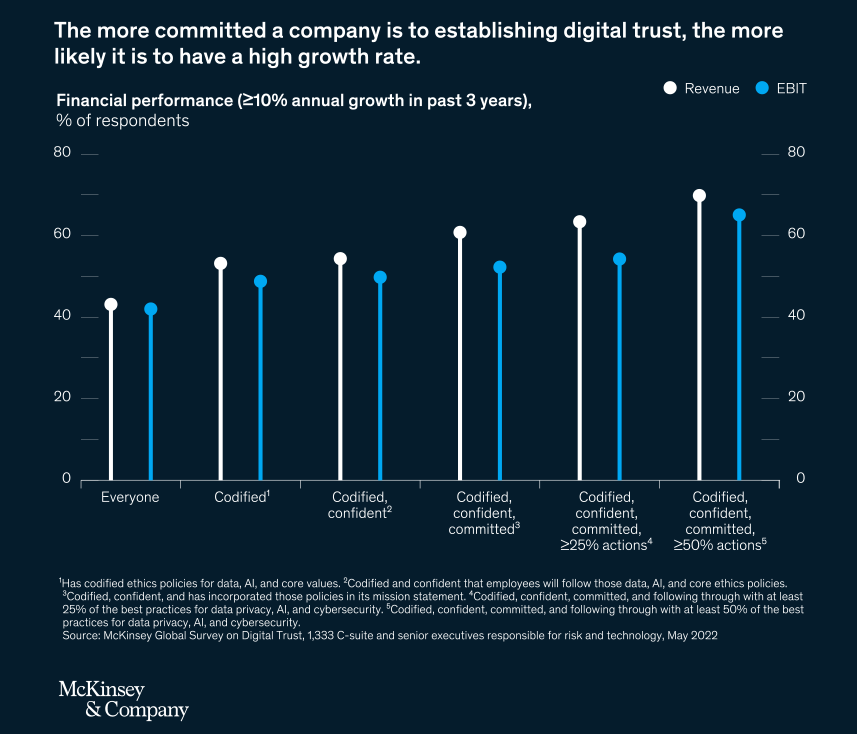
Digital trust is more critical than ever in our interconnected world. Trust is fading between individuals, governments, and technology providers, making it vital to restore confidence in digital technologies. To secure a future of progress and cohesion, it is crucial for technology developers and providers to make trust their top priority.
For a comprehensive look into the world of digital trust, check out our previous article on exploring the meaning and benefits of digital trust.
Fostering Digital Trust for Business Success
The commitment to earning trust lies at the heart of the digital trust concept, where individuals expect digital technologies and organizations to safeguard their interests and defend societal values. Following, we will explore an extensive list of how to foster and maintain digital trust in today's interconnected world.
1- Data Protection and Security:
Nowadays, any cybersecurity incident or service downtime can result in severe damage to an organization's reputation and finances, particularly when security is at risk.
- Data Security
- Implement robust cybersecurity measures to protect customer data from breaches, including encryption and intrusion detection systems.
- Monitor for vulnerabilities and conduct penetration testing to proactively identify and address weaknesses.
- Perform your risk and trust assessments early in your digital business process. Companies should shift from making one-time, risk-based decisions to regularly analyzing risks in real time.
- Compliance
- Ensure that your company complies with relevant data protection and privacy regulations, such as GDPR, CCPA, HIPAA, etc.
- Maintain a comprehensive record of compliance efforts and adherence to regulations and appoint a dedicated data protection officer.
Poor personalization and lack of trust cost U.S. organizations $756 billion last year, as 41% of consumers switched companies. *
* Accenture
- Consent and Permissions
- Obtain clear and informed consent from users before collecting and using their data.
- Allow users to control and customize their data-sharing preferences, including opting in or out of data collection, or even withdrawing their consent at any time.
- Incident Response Plan
- Develop a well-defined plan (regularly tested and updated) for responding to data breaches or security incidents.
- Train employees on incident response procedures to ensure a swift and effective response.
- Third-party Vendors
- Ensure that any third-party vendors or partners you work with also adhere to strong data protection and privacy standards.
- Conduct due diligence and contractual agreements to verify their commitment to data security.

Source: McKinsey Global Survey
2- Transparency and Accountability:
Assessing digital trust isn't a mere checklist; it's about having the right tools, a solid foundation, and a clear plan to achieve the right results. Prioritizing trust requires transparency with users, the ethical use of data, complete openness and clear communication.
- Transparency & Clear Communication
- Provide clear and straightforward guidance on how users can safely and effectively engage with your company.
- Be open and honest about how you collect, use, and protect customer data, using easy-to-understand, jargon-free explanations.
- Clearly communicate your privacy policies and terms of service and ensure users can access them easily.

- Ethical Data Use
- Only use customer data for the purposes it was collected for and avoid unethical or invasive uses.
- Establish and communicate strong ethical data usage policies within your organization.
- User Education
Educate your customers about the importance of online security, privacy, and how to protect themselves, through updated educational materials.
- Offer resources to help them make informed decisions, such as best practices for setting strong passwords and recognizing phishing attempts.
- Accountability
- Take responsibility for any mistakes or breaches that occur and take corrective actions.
- Communicate openly and honestly with affected parties during security incidents and outline the steps taken to rectify the situation.
- Care and Responsiveness
Despite careful planning, unforeseen issues can arise. It's crucial for companies to showcase their attention in overseeing and managing their operations, even if the root cause of a digital trust incident remains ambiguous. This commitment should be ingrained in the organizational culture.
It’s more than just a buzzword. Those companies that can demonstrate trust are going to be able to develop better services, better experiences, get better information to then tailor things for consumers. *
* Paul Daugherty, Accenture Chief Technology Officer
3- User Empowerment and Privacy:
In this digital age, businesses can empower their customers by providing responsive support, giving users control over their data, and understanding their expectations. This fosters trust, loyalty, and stronger customer relationships.
- Customer Support
- Provide responsive and helpful customer support to address privacy concerns and questions.
- Ensure support staff are well-informed about privacy policies and regulations to assist users effectively.
- User Control
- Give users the ability to access and manage their data through user-friendly dashboards and tools.
- Empower users to review, edit, or delete their personal information as needed.
- Understand User Expectations
The level of trust can change depending on what a user is doing. For instance, when someone buys an item from a shop, with cash, they don't need to worry too much about digital trust. But if they use a credit card online to purchase the same item, they trust that the digital transaction will be accurate, their payment will be secure, and their item will arrive as promised. Trust issues happen when people don't understand the specific user expectations.

4- Invest in Technology
Continuously invest in and stay current with advanced technologies like encryption, multi-factor authentication, and secure cloud solutions to safeguard user data. In your digital trust strategy, consider the following key technological advancements:
- Data monitoring Using AI
AI-based monitoring of data enhances digital trust by ensuring data accuracy and authenticity, detecting anomalies, and protecting against unauthorized data access. While AI isn't a complete solution and may have limitations in certain contexts, it's rapidly advancing, offering potential solutions to improve digital trust and mitigate biases. It can identify fake or manipulated content, enhance identity and access management, and prevent unauthorized data access, reducing the risk of data breaches.
- Leveraging Data Trusts
Data trusts, similar to how a bank handles financial assets but for data, are promising. Independent third parties validate, control, secure, and share data, while ensuring the legal rights of data owners. They reduce data silos, offering valuable benefits to users. Data trusts can be a single company or a group of trusted companies working together for everyone's benefit. They enhance digital trust by improving data management, access, and security while ensuring privacy and compliance in an increasingly data-driven world.
In conclusion, digital trust is now a strategic essential, demanding the active involvement of business leaders beyond the world of IT and cybersecurity. Waiting is not an option, as technology constantly introduces new digital threats. To build digital trust, engage proactively, innovate, and invest in trust-building measures. It's an ongoing, ingrained practice, ensuring technology serves individuals and society, benefiting a global community. As we navigate the digital era's challenges and opportunities, let’s embrace digital trust as the foundation for a better, interconnected future.